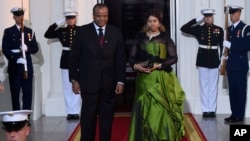Media freedom is under attack in the African kingdom of Swaziland, claim journalists who say they face constant harassment. The journalists from Africa’s last absolute monarchy say the king has throttled the media to advance his own interests and protect his wealth in a nation with some of the world’s highest rates of poverty, unemployment and AIDS.
From the outside, the tiny, landlocked nation of Swaziland looks like it has a disproportionate share of problems.
According to a scathing report from U.S.-based think tank Freedom House, 43 percent of Swazis live in chronic poverty, a quarter of adults have HIV, and life expectancy is a mere 48 years.
But journalists and activists from Africa’s last absolute monarchy say they are all but forbidden from publishing any stories that paint their country in a negative light.
Censorship, prison
The nation’s leadership underscored that point last month, when a prominent journalist and a human rights lawyer were sentenced to two years’ imprisonment for an article that criticized the judicial system.
Journalist Nqobile Hlatswhayo heads the Media Workers Union of Swaziland, and he said journalists face strong pressure to censor their own work.
“Journalists are expected to toe the line and only report positive messages about the country and about cultural activities, what is government doing for the people, and all that," said Hlatswhayo. "But they are expected to bury bad stories that can, like they say, paint the country badly outside.”
Swazi Observer managing editor Mbongeni Mbingo, said he nearly lost his job over a 2009 article that he did not even write. His piece, he said, was a mere accounting of the king’s fleet of luxury cars. But when media in neighboring South Africa got hold of the details, he said they spun it into a tale of an insensitive monarch who spends profligately on luxuries while his people starve.
“It did get me into a lot of water. Hot, hot water. I could have lost my job over it, and I am grateful I did not, and it is one era of my career that I look at and say, ‘I survived that bullet,’” he said.
Respect vs. freedoms
Like many people living in Swaziland, Mbingo walks a tightrope between reverence for his king and his demand for basic freedoms.
“I think our perspective when we published those stories was partly to say, the king drives in such a car befitting his status. So it is something that we, you know, we hold the king in very high esteem in our country, and we also want to see that he gets what befits his status as a king," said Mbingo. "So if he gets a new car, the Swazi public must know that, okay, the king has these type of wheels because because, maybe one could say, he deserves to have that type of car.”
Biut activist Mandla Hlatshwayo said that while he respects the institution of the monarchy, he has no love for the current king. He said unshackling the media is the first step toward turning things around in Swaziland.
“It will improve everyone’s life. It will even improve the outlook of those in power, because they cannot wish away the voice of the ordinary people," he said. "It will also inform the world in terms of its engagement with Swaziland not to actually avoid the real issues. So if the media was free, I think many people in Swaziland who are in power will have nowhere to hide. But right now they are able to ensure that nobody has information.”
Nqobile Hlatshwayo, who also writes for the Observer, said that despite the constraints upon her, however, there is no place she would rather be.
“I want to be there when my country changes for the better. I want to be there when dissenting voices will not be suppressed. And I want to make sure that activism is allowed in Swaziland. And if I do not get that bullet - who will?” she asked.
Until that day, she said, she waits and hopes.




